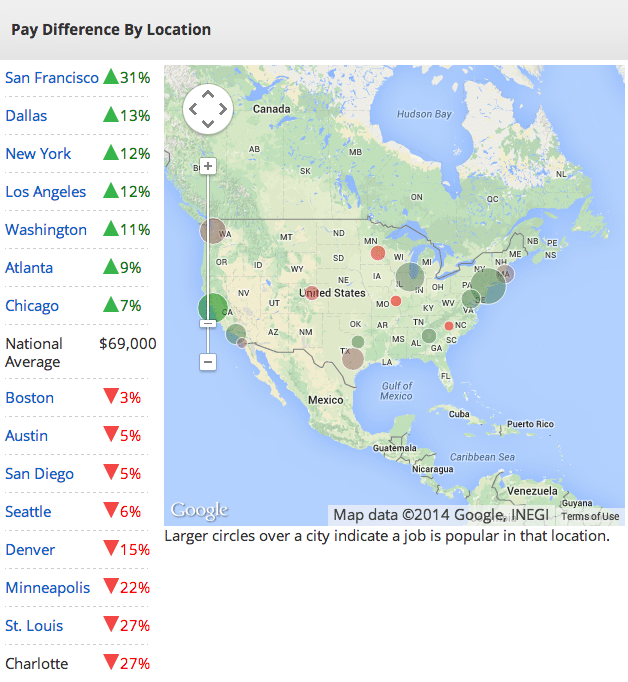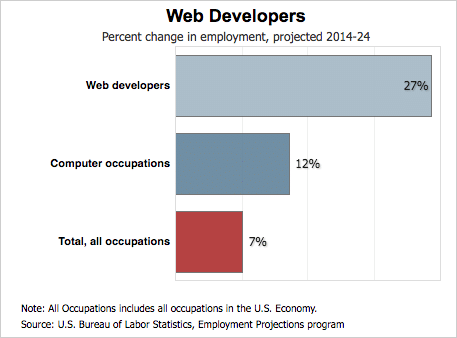
You’re tech-savvy. You know some basic HTML. Maybe you’ve even dabbled with JavaScript once or twice. You love working on challenging, creative projects—and you’re ready for a serious career change. If this sounds familiar, front-end web development – and the front-end developer salary that comes with it – might just be the career you’ve been looking for.
Great salaries, high demand, airtight job security, and plenty of options for mobility are just some of the perks that come with a career in web development. Learning the skills you’ll need in order to earn these benefits can be challenging, but once you’ve got them, you’ll be surprised how many doors they can open.
What is the range for a front-end developer salary?
Front-end web developers have one of the most bankable skill sets on the job market today. According to Paysa, the national average salary for front-end developers is about $103,000.
New York City-based tech recruiter Jen Pugh says, “For a mid-level front-end developer here in New York, it’s pretty standard to see salaries that start in the low $100,000s.” For entry-level developers, salaries are still extremely competitive and often far higher than other entry-level roles.
Where are front-end developer salaries highest?
But not all job markets are created equal. Location plays a major role in what you’ll ultimately earn as a front-end developer. In fact, according to data from Payscale, geographic location is the biggest factor affecting pay for front-end web developers—even more so than experience.
The seven cities with the highest average salary for developers are, from most to least dollars above average: San Francisco, Dallas, New York, Los Angeles, Washington, D.C., Atlanta, and Chicago.
The lowest? Charlotte, St. Louis, Minneapolis, and Denver.
Want to check how much your city stacks up in terms of take-home pay? Payscale’s search engine lets you plug in your location and years of experience to gauge the general salary range in your area. But if you’re not thrilled with the results, don’t worry.
“It’s pretty easy to find a company that’s willing to relocate front-end developers since there’s so much demand,” Pugh said. “Especially if you have that strategic, problem-solving DNA.”
High Demand for the Highly Skilled
For professionals in many fields, finding a new job can be daunting. Scores of applications can go unanswered, and the competition for jobs—even at the highest levels—can be fierce. But for many skilled front-end developers, phones are ringing off the hook.
“Hiring great front-end developers is insanely competitive,” said Pugh. “It’s a total seller’s market. A lot of these folks are getting seven or eight emails a day from recruiters. Front-end devs are really at a place where they can pick and choose.”
According to Pugh, “Anyone who knows HTML5, CSS3, and popular JavaScript frameworks like AngularJS and BackboneJS is highly in demand.” In fact, the Bureau of Labor Statistics notes that web developer employment is projected to grow a whopping 27 percent from 2014 to 2024, faster than the average for all other occupations.
It seems like everyone’s looking for developers with great coding skills. But there’s another skill that employers prize even more.
“Everyone’s looking for a problem solver,” she said. “Not just people who can code, but people who can sit down with visual and UX designers and solve major challenges.” For career changers coming from other disciplines, especially those who have significant experience working cross-functionally, this approach often comes naturally. It can also be extremely lucrative: Pugh added that developers who can demonstrate this approach often command higher salaries.
How Front-End Developer Salaries Compare
The explosion of mobile and e-commerce makes strong coding expertise a must for a wider range of companies than ever. But this also means that the abundant supply of jobs in the field can be offset by heightened competition among budding developers. So how do front-end devs stack up against the rest?
According to Paysa, national average salaries look something like this:
- Software Engineers: $109,442
- Back-End Developers: $90,452
- Front-End Web Developers: $76,200
- Programmers: $91,178
- Web Designers: $68,077
These jobs are all similarly rooted—so why the variation? One major reason is that each position plays a different but integral part in making digital technology tick, and each one requires a different skill set. Yet another reason is simple supply and demand: how many companies need people to fill these roles, and how many skilled professionals are available to fill them?
While front-end devs might not top the chart in terms of salary, their role comes with some unique challenges and opportunities. They work in partnership with everyone listed above, giving them a broader role in the development process, as well as he chance to make valuable networking connections that can lead to other career opportunities down the road.
“Everyone’s looking for a problem solver,”
Front-end development is also a pretty flexible field in terms of where and when it can get done. In addition, the amount of freelance work available tends to be just as plentiful as full-time openings. All in all, it’s a field with a lot of options.
The Bottom Line
High demand, strong salaries, and loads of flexibility make front-end development a great choice for a career, whether you’re just starting your professional life or embarking on a new chapter. If you’re thinking about making a change, be aware that there’s a lot to learn—but plenty of reasons to learn it.
Want to learn more? See our Front End Web Developer Nanodegree program and start your journey to a new career!
Start Learning






